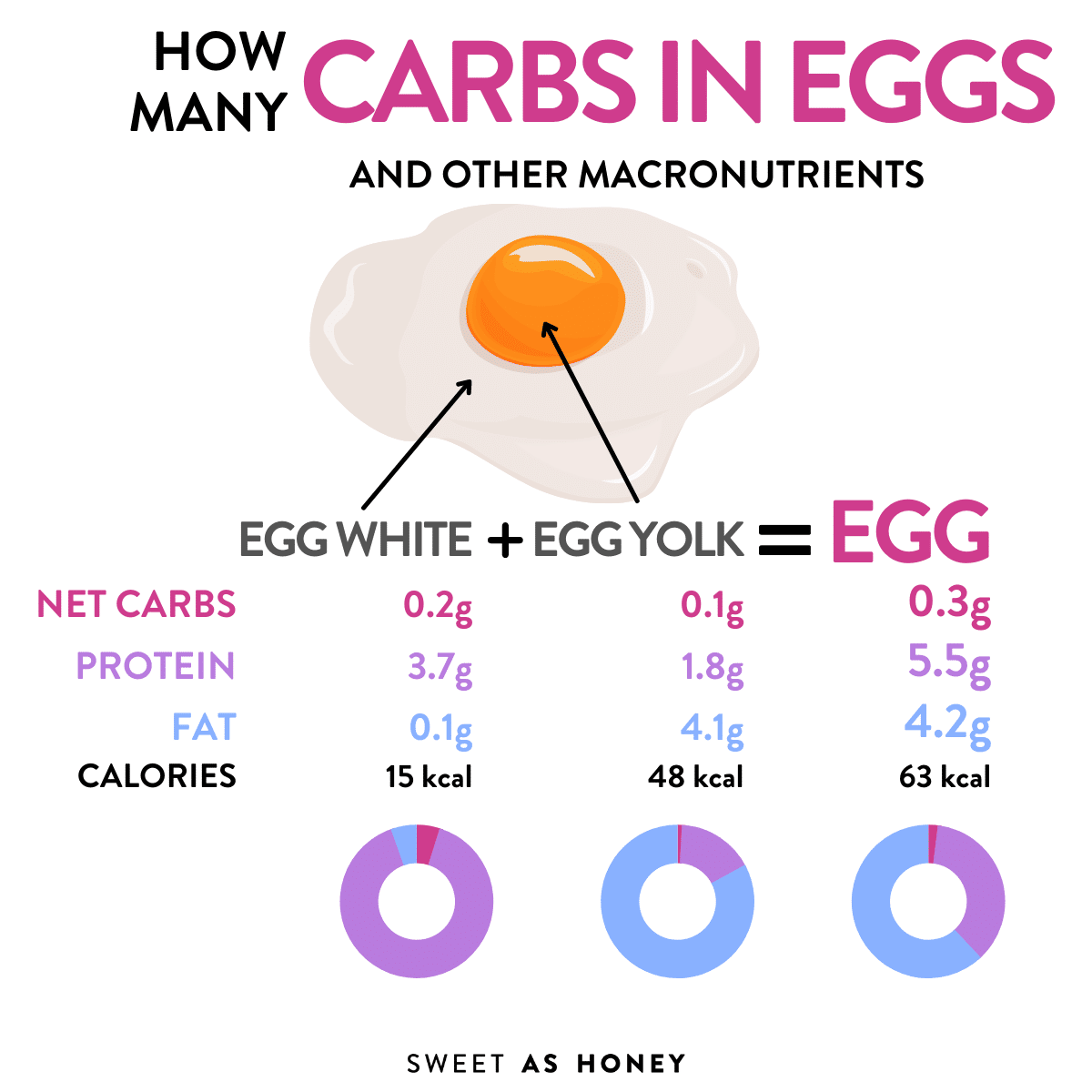How Many Carbs In Eggs?
This recipe may contain Amazon or other affiliate links. As an Amazon Associate I earn from qualifying purchases.
Eggs are everywhere on a keto diet. They provide taste and texture to baking recipes.
They bring healthy nutrients to your body in the form of proteins and vitamins. But you might be wondering how many carbs an egg brings.
Are Eggs Keto Friendly?
Yes! Eggs are definitely keto-friendly. A typical egg brings much less than one gram of net carbs!
But the Keto Diet is not just about carbs, it’s about the balance between Net Carbs and Fat and eggs are a very useful tool to help reach your macros!

Egg Nutrition Facts
A medium egg contains about 63 calories which are coming from the following macronutrients:
- 0.3 grams of Carbs (no fiber)
- 5.5 grams of Protein
- 4.2 grams of Fat
As a result, eggs are a very convenient tool to boost your protein intake while maintaining enough fat and keeping carbs low.
Micronutrients In Eggs
Eggs are not just protein powerhouses, they also contain many micronutrients that are useful for your body, in particular Vitamin D and B12.
A single egg brings:
- 60mg of Potassium
- 237 IU of Vitamin A (10% of your recommended intake)
- 0.4 µg of Vitamin B12 (16% of your recommended intake)
- 0.9 µg of Vitamin D (60% of your recommended intake)
- 25 mg of Calcium
- 0.8 mg of Iron (5-10% of your recommended intake)
- 5.3 mg of Magnesium
- 90 mg of Omega-3
- 95 mg of Phosphorus
- 25 µg of Selenium
Full Nutrition Panel
Frequently Asked Questions
Egg Whites contain the bulk of the carbs in eggs – about 0.2 grams – but almost none of its fat (only 0.1 grams), and a fair portion of the protein (3.7 grams).
As a result, the 15 kcal in Egg Whites are almost exclusively coming from protein. They are therefore often used to boost the protein content of any recipe without altering the carbs or the fat.
The yolk of an egg contains only 0.1 grams of net carbs. However, it contains most of the fat present in eggs with 4.1 grams out of the 4.2 grams of fat that a full egg contains.
The way you cook your eggs does not affect their net carbs content at all.
Your scrambled eggs, hard-boiled eggs, soft-boiled eggs, poached eggs, over-hard eggs, sunny-side-up eggs, and eggs in an omelette will all have the same amount of net carbs.
The only thing that might change is the fat if you were to cook your eggs in oil or butter.
Health Benefits Of Eggs On A Keto Diet
Eggs are full of protein and vitamins (Vitamin D, B12, and A in particular), which all have possible health benefits.
Eye Health
Beyond micronutrients and macronutrients, Eggs also contain lutein and zeaxanthin which have been found to protect from macular degeneration.
Muscle Mass
Being loaded in protein makes eggs a particularly good ally to building muscle mass. After all, isn’t Mr. Strong eating eggs for breakfast, lunch, and dinner?
Brain Health and Development
Eggs are a source of Choline, which has been linked with reduced memory loss in older patients.
When Not To Eat Eggs
Eggs are one of the most common allergens, in particular in children.
If you have never eaten eggs, make sure to try a small portion and contact your doctor if you notice any allergy symptoms such as rash, stomach ache, or difficulty breathing.
Eggs And Cholesterol
As you found in the nutrition label above, Eggs do contain a fair amount of cholesterol.
However, eating food with cholesterol is perfectly safe. Blood cholesterol levels and dietary cholesterol are two very different things.
Dietary cholesterol generally has a negligible effect on blood cholesterol.
Risks of Eating Eggs
Beyond common allergies, some studies show that eating eggs daily increases the risk of diabetes. Frequent egg consumption is also linked to heart disease and some forms of cancer.
Keto Recipes With Eggs
On a keto diet, many recipes include eggs. Here are my favorite low-carb recipes with eggs.
Breakfast
Lunch
Dinner
Drink
Posted In:
Disclaimer
The recipes, instructions, and articles on this website should not be taken or used as medical advice. The nutritional data provided on Sweetashoney is to be used as indicative only. The nutrition data is calculated using WP Recipe Maker. Net Carbs is calculated by removing the fiber and some sweeteners from the total Carbohydrates.
You should always calculate the nutritional data yourself instead of relying on Sweetashoney's data. Sweetashoney and its recipes and articles are not intended to cure, prevent, diagnose, or treat any disease. Sweetashoney cannot be liable for adverse reactions or any other outcome resulting from the use of recipes or advice found on the Website.









Share this post!
If you enjoyed this post, share it with your close ones!
Leave a comment